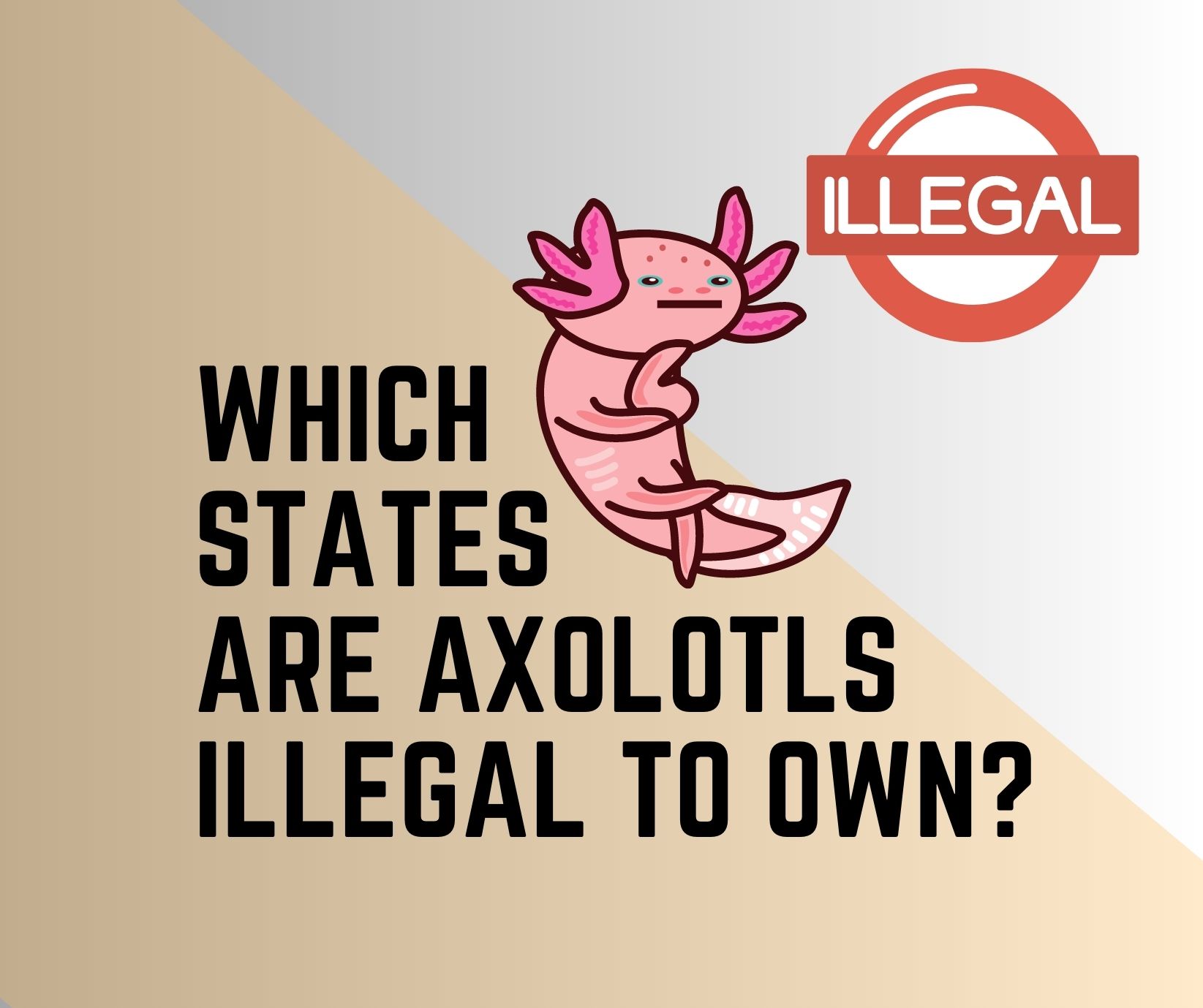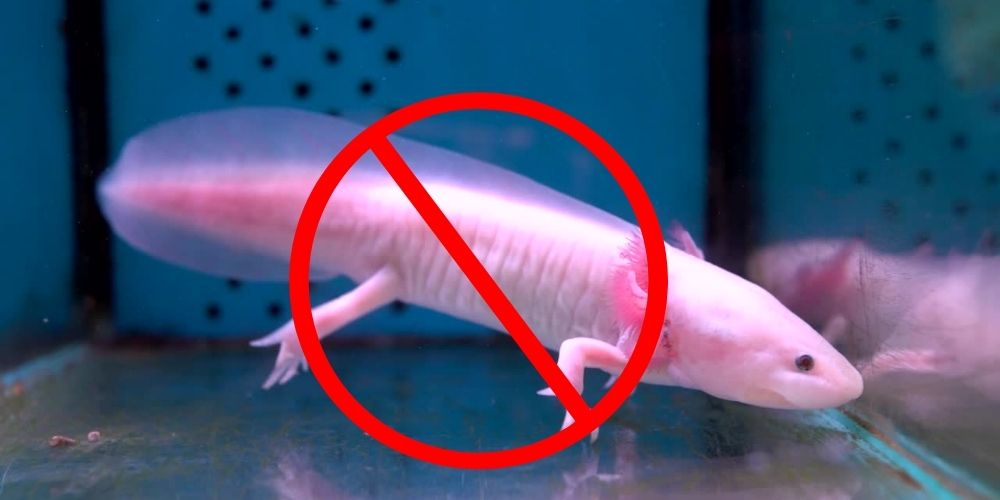
Axolotls, or the Mexican walking fish, are one of the most fascinating creatures. These amphibians have captured the attention of enthusiasts worldwide, whether for pet or research purposes or just out of curiosity. Axolotls are a type of salamander that is purely aquatic and known for their regenerative abilities. They never fully undergo metamorphosis, and most of them keep their larval features similar for life. Axolotls are popular as pets across the world, but they are not legal to own and breed in many places. Some States in the U.S.A. have restrictions on keeping Axolotls as pets.
The United States Fish and Wildlife Service has listed Axolotls as a species of concern. In the wild, Axolotls are on the verge of extinction and thus have become critically endangered. Due to this classification, many U.S. states regulate the ownership and breeding of Axolotl. Besides that, some states even have specific laws concerning Axolotls’ possession and transportation.
If you are an Axolotl enthusiast and looking forward to keeping it as a pet, learn about the laws in your State. Doing so is important to ensure that you are not breaking any regulations. For more, join us in this article as we explore the legality of Axolotls in different states.
What States Are Axolotls Illegal In
Since a lot of marine and wildlife services list Axolotls as a species on the verge of extinction, these amphibians are illegal as pets in many States.
Within the United States, Axolotls are illegal to own in States including California, Maine, New Jersey, and Virginia. New Jersey has a ban on the possession of Axolotls with a concern of preventing the chances of their cross-breeding with the native Tiger Salamander.
Similarly, States, including New Mexico and Hawaii, allow keeping Axolotls as pets under permit, but they mark it illegal to import these amphibians from other States. At the same time, all the remaining States in the U.S. allow keeping Axolotls as pets without any permit.
*While Axolotls are legal in many U.S. States, the local laws of some cities and districts might have a ban on them. Please go through your local exotic pet laws before getting an Axolotl as a pet.
In Canada, owning Axolotls is illegal in New Brunswick, British Columbia, and Prince Edward Island. Whereas for owning an Axolotl in Nova Scotia, a permit is mandatory. Besides that, Axolotls are legal in the entire Manitoba Province but illegal only in Winnipeg city.
Why are Axolotls Illegal in some States, Cities, or Districts?
Animals that are illegal to own in different States are often due to the verge of extinction. Animal trading, environmental changes, habitat loss or degradation, invasive species, diseases, and Overexploitation are some of the common reasons why many animal species today are categorized as ‘Critically endangered.’ However, when we talk about Axolotls, this isn’t the only reason.
Axolotls are banned as pets or for trade in many states due to their declining population, but there’s more to it. Axolotls have been in captivity as pets and for breeding purposes for decades now. Their popularity isn’t new. However, due to keeping and breeding Axolotls in captivity, genetic and behavioral characteristics have changed to the point that most of them today are not similar to the ones originally found in the wild. These amphibians in captivity have been cross-breed with Tiger Salamander, which has tweaked their DNA.

Why are Axolotls Illegal to Own in Some States and Provinces?
And since Axolotls have been bred in captivity for many generations, that too in the absence of natural selective forces, we today have slightly to very different species of them around us. That is why, even if we released pet Axolotls in Lake Xochimilco (their native habitat), it would keep their species going into extinction.
For instance, reptiles, including tegus, green iguanas, or some species of pythons or fishes like Common goldfish, when released again in the ecosystem, cause unforeseen harm. While most of them do good as pets, when the same pets are released into the wild, they have devastating effects on ecosystems. In fact, such pets also outcompete local animals to that extent when they start facing extinction.
Table of USA States Axolotls are Legal and Illegal
| State | Axolotls Legal to Own? |
|---|---|
| California | Illegal |
| Maine | Illegal |
| New Jersey | Illegal |
| Virginia | Illegal |
| New Mexico | Illegal |
| Hawaii | Illegal |
| Kentucky | Legal |
| New York | Legal |
| Pennsylvania | Legal |
| Massachusetts | Legal |
| Washington | Legal |
| Georgia | Legal |
| Oregon | Legal |
| Texas | Legal |
| Michigan | Legal |
| Illinois | Legal |
| Ohio | Legal |
| Florida | Legal |
| Arizona | Legal |
| Colorado | Legal |
| North Carolina | Legal |
| Tennessee | Legal |
| Wisconsin | Legal |
| Maryland | Legal |
| Oklahoma | Legal |
| Indiana | Legal |
| Minnesota | Legal |
| Missouri | Legal |
| Utah | Legal |
| Kansas | Legal |
| Iowa | Legal |
| Arkansas | Legal |
| Louisiana | Legal |
| Alabama | Legal |
| Mississippi | Legal |
| Nebraska | Legal |
| South Carolina | Legal |
| West Virginia | Legal |
| North Dakota | Legal |
| South Dakota | Legal |
| Idaho | Legal |
| Montana | Legal |
| Wyoming | Legal |
Potential Consequences of Violating Axolotl Ownership Laws
The consequences of violating axolotl ownership laws can depend upon the State or city where you are violating the laws. In some places, the consequences may be relatively minor, such as a fine or warning. The fine, however, can range from $250 to $5000 (Civil fine) or $5000 up to $50,000 (criminal fine), followed by a day in imprisonment. However, in other cases, the consequences can be severe.
For instance, in some states, if you are keeping/ trading an axolotl without the proper permits, you may end up with fines or potential criminal charges. In extreme cases, the consequences may even extend to imprisonment. Violating such laws can also harm the reputation of the pet trade. It can further undermine efforts to promote responsible pet ownership.
Besides legal consequences, one must also consider potential environmental. As you release pet Axolotls into the wild or if they escape from captivity, they can potentially harm native species and ecosystems. As a result, with adversely impact biodiversity and potential economic costs if ecosystems due to disruption.
How to Ensure Compliance with Axolotl Ownership Laws?
Here are some steps every potential Axolotl owner should take to ensure compliance with Axolotl ownership laws:
- Before getting an Axolotl as a pet, research the laws of your State, City, or County concerning their ownership. Learning about obtaining a permit and other legal requirements.
- If obtaining Axolotls is legal in your State, make sure you get the pet from a reputable dealer or breeder only. It is important to get the amphibian from a source who can provide documentation and has not got the animal illegally in the first place.
- Axolotls are aquatic amphibians, and they require specific environmental conditions to thrive healthy. Make sure you prepare a clean, spacious, and suitable tank/ aquarium before getting an Axolotl home.
- If by any chance you can no longer care for your pet Axolotl, do not release the poor amphibian into the wild. Releasing a pet animal in the wild can potentially harm the native species and ecosystem. Instead, search for a reputable breeder, or a trusted new home, or give the animal to any local animal rescue organization.
- Lastly, whether you are an Axolotl enthusiast or not, always report illegal activity concerning this species. Report to the appropriate authorities upon suspecting illegal owning or transportation of axolotls.
Alternatives to Owning Axolotls as Pets
If you want to obtain an Axolotl as a pet but are helpless due to legal or other reasons, here are some alternatives for you:
- Find aquariums and nature centres around you that keep Axolotls on public exhibits. You can visit such facilities, learn about this unique amphibian and observe from close.
- Individuals keen on doing something for Axolotls can volunteer at a local conservation organization. Find organizations that work to protect and conserve axolotls and volunteer with your time and resources as possible.
- Support Axolotl conservation efforts financially and donate to organizations. Various such organizations protect and conserve axolotls along with other threatened species. You can either find them online or in your locality as well.
- Or, learn about other fascinating aquatic species that are meant to pet and are legal in your area. You can satisfy your interest in aquatic life by keeping them.
Conclusion
Axolotls are illegal in different States and Cities, including California, Maine, New Jersey, Virginia, New Brunswick, British Columbia, and Prince Edward Island. The concern over Axolotls’ declining population and its impact on native wildlife and ecosystems leads authorities to take such steps.
